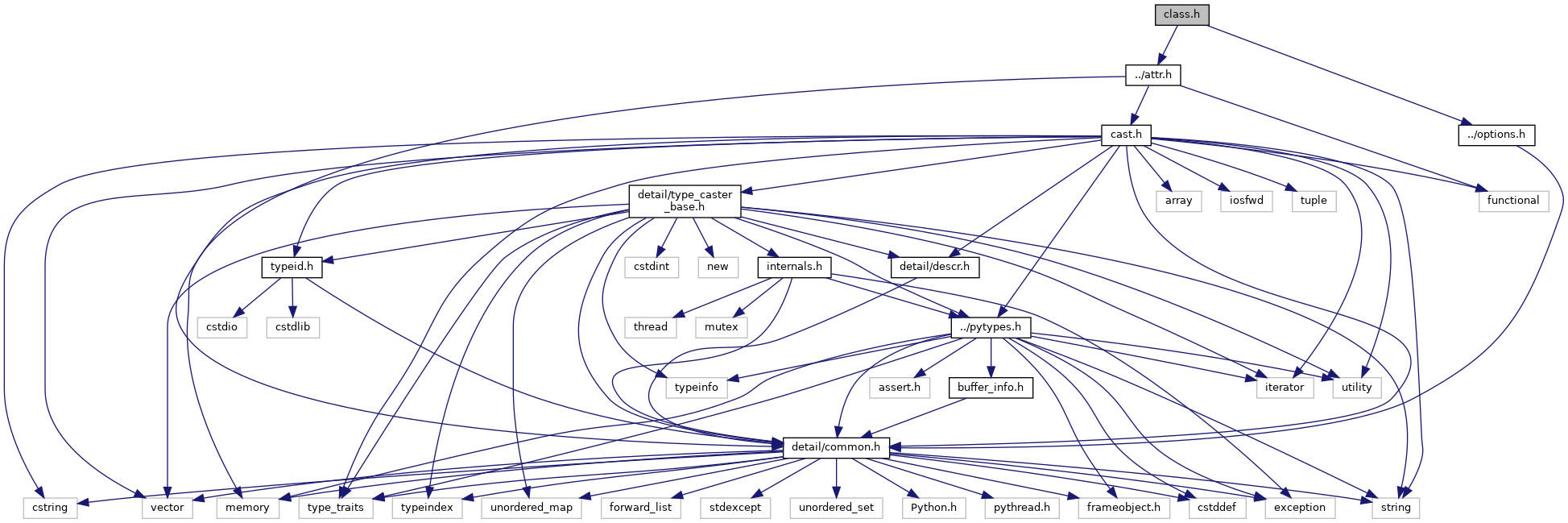|
| void | add_patient (PyObject *nurse, PyObject *patient) |
| |
| void | clear_instance (PyObject *self) |
| |
| void | clear_patients (PyObject *self) |
| |
| bool | deregister_instance (instance *self, void *valptr, const type_info *tinfo) |
| |
| bool | deregister_instance_impl (void *ptr, instance *self) |
| |
| void | enable_buffer_protocol (PyHeapTypeObject *heap_type) |
| | Give this type a buffer interface. More...
|
| |
| void | enable_dynamic_attributes (PyHeapTypeObject *heap_type) |
| | Give instances of this type a __dict__ and opt into garbage collection. More...
|
| |
| std::string | error_string () |
| |
| std::string | get_fully_qualified_tp_name (PyTypeObject *type) |
| |
| PyTypeObject * | make_default_metaclass () |
| |
| PyObject * | make_new_instance (PyTypeObject *type) |
| |
| PyObject * | make_new_python_type (const type_record &rec) |
| |
| PyObject * | make_object_base_type (PyTypeObject *metaclass) |
| |
| PyTypeObject * | make_static_property_type () |
| |
| int | pybind11_clear (PyObject *self) |
| | dynamic_attr: Allow the GC to clear the dictionary. More...
|
| |
| int | pybind11_getbuffer (PyObject *obj, Py_buffer *view, int flags) |
| | buffer_protocol: Fill in the view as specified by flags. More...
|
| |
| PyObject * | pybind11_meta_call (PyObject *type, PyObject *args, PyObject *kwargs) |
| | metaclass __call__ function that is used to create all pybind11 objects. More...
|
| |
| void | pybind11_meta_dealloc (PyObject *obj) |
| | Cleanup the type-info for a pybind11-registered type. More...
|
| |
| PyObject * | pybind11_meta_getattro (PyObject *obj, PyObject *name) |
| |
| int | pybind11_meta_setattro (PyObject *obj, PyObject *name, PyObject *value) |
| |
| void | pybind11_object_dealloc (PyObject *self) |
| |
| int | pybind11_object_init (PyObject *self, PyObject *, PyObject *) |
| |
| PyObject * | pybind11_object_new (PyTypeObject *type, PyObject *, PyObject *) |
| |
| void | pybind11_releasebuffer (PyObject *, Py_buffer *view) |
| | buffer_protocol: Release the resources of the buffer. More...
|
| |
| PyObject * | pybind11_static_get (PyObject *self, PyObject *, PyObject *cls) |
| | pybind11_static_property.__get__(): Always pass the class instead of the instance. More...
|
| |
| int | pybind11_static_set (PyObject *self, PyObject *obj, PyObject *value) |
| | pybind11_static_property.__set__(): Just like the above __get__(). More...
|
| |
| int | pybind11_traverse (PyObject *self, visitproc visit, void *arg) |
| | dynamic_attr: Allow the garbage collector to traverse the internal instance __dict__. More...
|
| |
| void | register_instance (instance *self, void *valptr, const type_info *tinfo) |
| |
| bool | register_instance_impl (void *ptr, instance *self) |
| |
| void | traverse_offset_bases (void *valueptr, const detail::type_info *tinfo, instance *self, bool(*f)(void *, instance *)) |
| |
| PyTypeObject * | type_incref (PyTypeObject *type) |
| |
| PyObject* pybind11_meta_getattro |
( |
PyObject * |
obj, |
|
|
PyObject * |
name |
|
) |
| |
|
inline |
Python 3's PyInstanceMethod_Type hides itself via its tp_descr_get, which prevents aliasing methods via cls.attr("m2") = cls.attr("m1"): instead the tp_descr_get returns a plain function, when called on a class, or a PyMethod, when called on an instance. Override that behaviour here to do a special case bypass for PyInstanceMethod_Types.
Definition at line 175 of file class.h.

